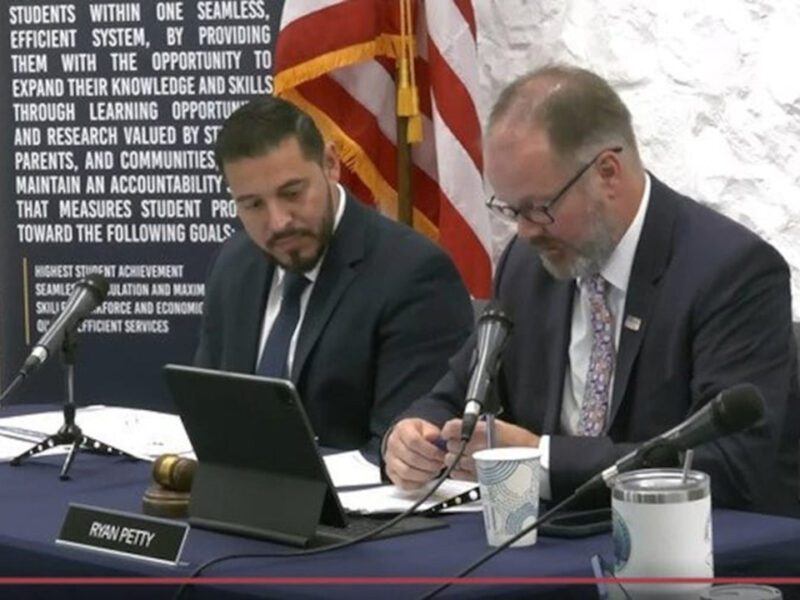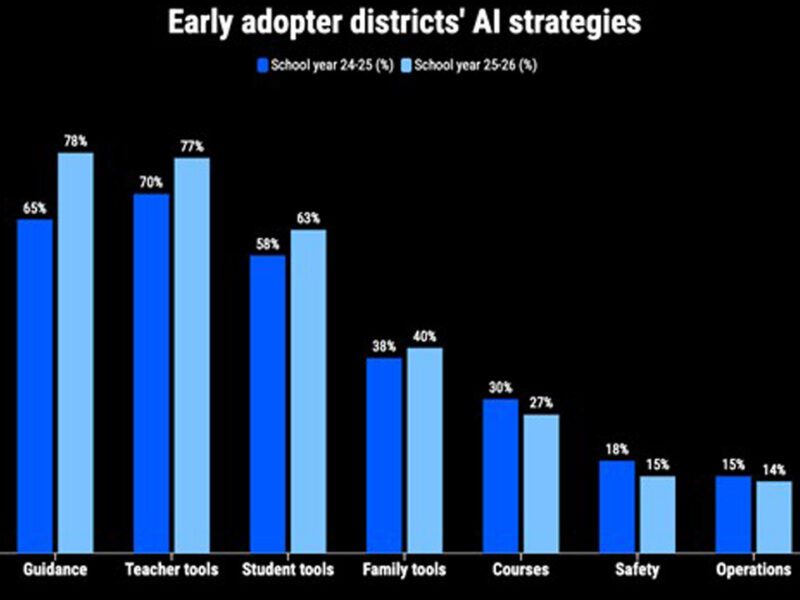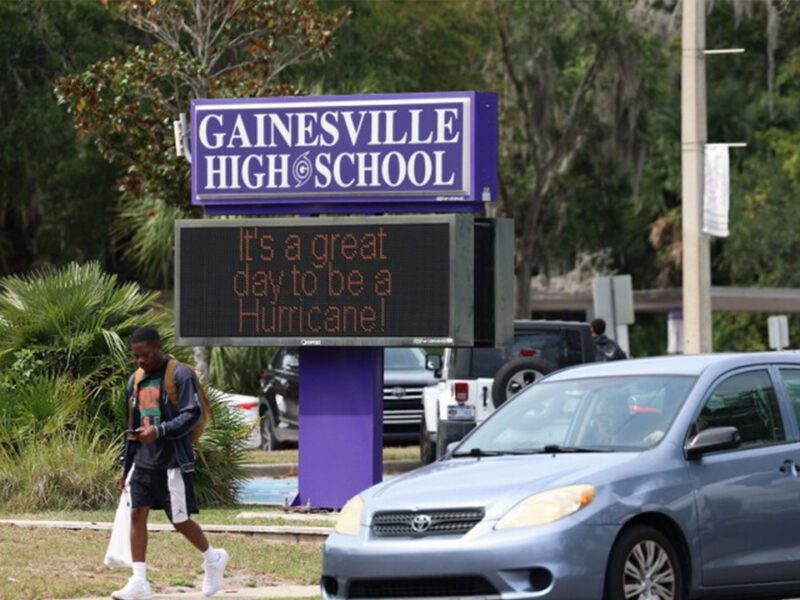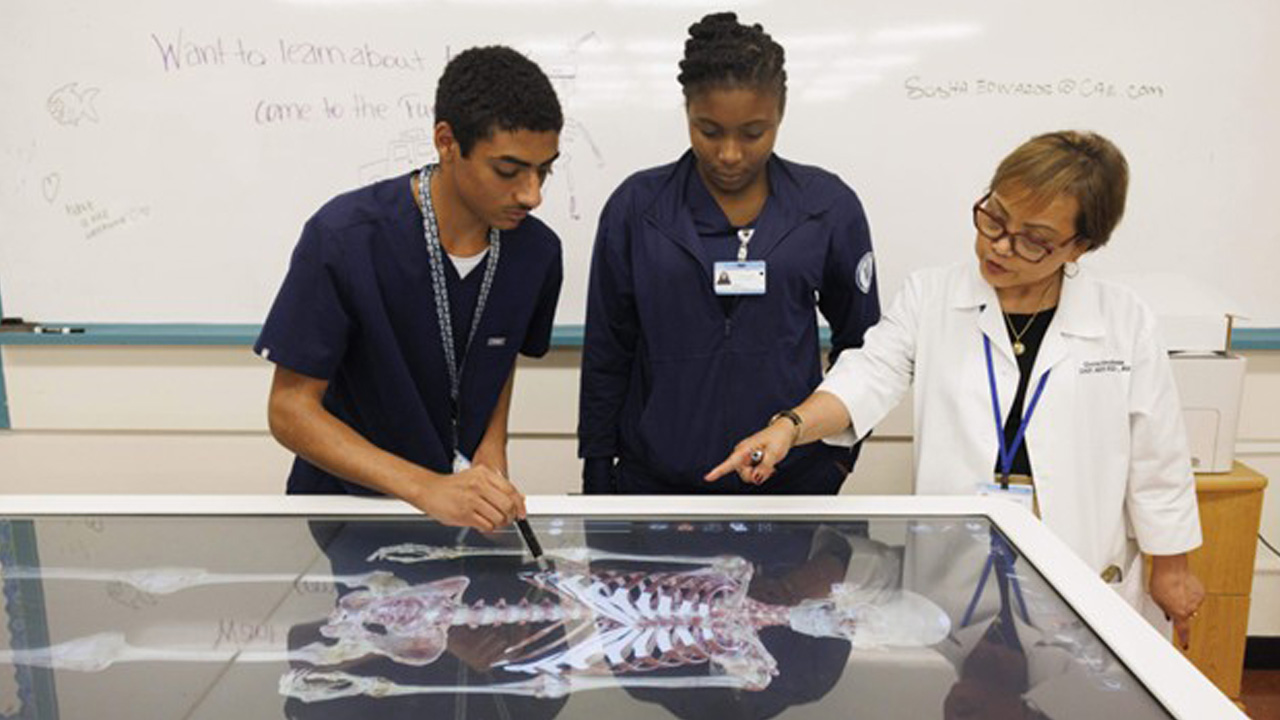
‘A hidden gem’: Take a look inside Miami’s oldest vocational school
Miami Herald | By Clara-Sophia Daly |
In a city where the cost of living keeps rising and a college degree can feel out of reach, Miami’s Lindsey Hopkins Technical College offers another path to success — one built on skills, not credentials. For 80 years, the school, one of Miami-Dade County Public Schools seven technical colleges, has quietly trained workers in the trades and technical careers that keep South Florida running: electricians, nurses, auto mechanics and cooks.
For many of its students — immigrants, single parents, people who never finished high school — Lindsey Hopkins represents a rare promise of social and economic mobility. With tuition around $400 a semester, the programs are among the most affordable in Miami-Dade, opening doors to steady jobs in fields where demand remains high and where artificial intelligence is unlikely to replace human hands.
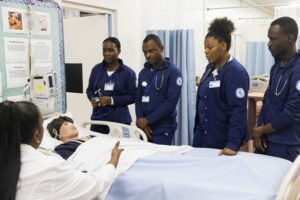
Students in the Licensed Practical Nurse program at Lindsey Hopkins Technical College listen to instruction from their teacher, S. Blackmon.
While much emphasis has been placed on how important the trades are for the work force, adult education programs faced a federal funding freeze, albeit briefly, this summer that raised concerns about the future of vocational schools. Florida, however, appears committed to the trades. Gov. Ron DeSantis pledged $726.9 million for such programs in the most recent budget. Miami-Dade County Public Schools offers at least 75 different career preparation programs across its seven technical colleges and 14 adult education centers.
Inside one of the school’s six sprawling buildings just north of downtown Miami, students in uniforms hold stethoscopes to each other’s chests, practicing checking a heartbeat. Down the hall, students assist in the dental program. In another building, a teacher instructs a class on how to bend metal electrical conduits. At the program’s onsite daycare, students care for toddlers in the Child Development course.

Lindsey Hopkins — which everyone calls Lindsey — opened in 1941 as a school to train veterans returning from fighting in the second world war. The school was opened in part through a $700,000 grant from the Department of Defense, according to John Karyan, a math professor at Lindsey who also acts as the school’s unofficial historian. This year, one of the teachers at Lindsey Hopkins will turn 90.
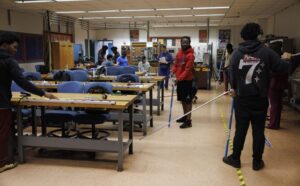
Students in the electricity program at Lindsey Hopkins Technical College in downtown Miami.
Lindsey offers adult general education classes such as math, reading, and English for Speakers of Other Languages (ESOL) courses. For those who haven’t earned a high school diploma, GED classes are offered as part of its general education program.
Career and technical programs include six different tracks in the “trade and industrial” program, like automotive repair, HVAC and marine technology; six tracks in “health sciences,” such as nursing, phlebotomy and dental assisting; and six tracks in family and consumer sciences, including early childhood education and cosmetology.
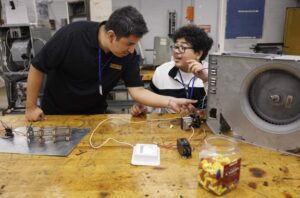
Gerald Flores, instructor in HVAC at Lindsey Hopkins Technical College, helps with wiring.
Students from nine Miami-Dade public schools can also enroll in courses at Lindsey while they are still in high school. And the school even has a special program for refugees and asylum seekers, which is completely free of cost.
The student body reflects the diversity of the city: 62 percent Black, 19 percent Hispanic and 18 percent white, with many Haitian-Americans, African Americans, Central Americans, and, more recently, Ukrainians. Many students are balancing school with family responsibilities and are housing-insecure.
For Kelley Garcia, 26, Lindsey has given her the ability to help support her family, buy her first car, and have a sense of pride in her work.
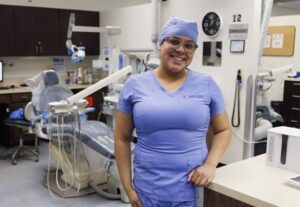
Kelly Garcia, a sterilization tech and graduate of Lindsey Hopkins Technical College, now works at the school’s Community Smiles program.
Growing up in a community of Honduran immigrants in Allapattah, she saw how her parents struggled to make ends meet. After graduating from high school, Garcia worked several jobs around Miami before she decided to go to Lindsey to study to become a Central Sterile Processing Technician, a job that involves decontaminating the instruments used in a dentist’s office.
When Garcia first arrived at Lindsey, she struggled. She said the tests were difficult, and she thought about quitting. Chantal Osborne, the school’s director, began to encourage her to keep working hard.
“Adults come with baggage,” said Osborne. “Whether it’s being from a broken family or having experienced trauma, our goal is to see them walk across graduation.”
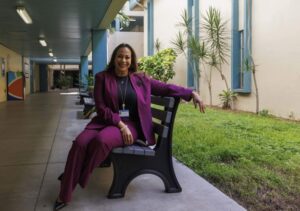
Chantal Osborne, director of Lindsey Hopkins Technical College, at the school.
With the support of tutors, Garcia was able to graduate and now works at the community dental clinic on-site, helping people who need dental care — including her parents, who had never received dental treatment before.
“It changed their lives and mine,” Garcia said. “Even my neighbors — I tell everyone about the community dental clinic.”
Garcia now plans to become a dental hygienist at Miami Dade College and hopes to one day buy a house and move out of her parents’ home.
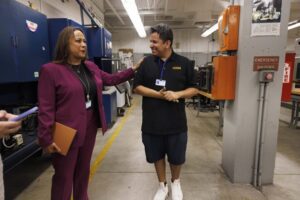
Chantal Osborne, director of Lindsey Hopkins Technical College, talks to Gerald Flores, the school’s instructor in HVAC program.
Gerald Flores, a graduate of the school himself, came back to teach HVAC a few years after completing the program.
Flores emphasizes to students that being skilled in electricity can open many doors – from small handyman jobs to large industrial projects. His classroom is filled with industrial AC systems that students practice on. Signs on the wall remind them how to safely use a ladder.
In the Marine Sciences Technology training room, students learn how to repair boat engines and fix fiberglass hulls. A nearby shipyard, RMK, will soon partner with the school to provide internships and job placement. Each year, the City of Miami Beach visits Lindsey to give a presentation and often hires students once they complete their programs. The culinary students serve lunch to the community multiple days a week, and events like nursing pinning ceremonies and Hispanic Heritage Month celebrations turn the cafeteria into a hub of campus life.
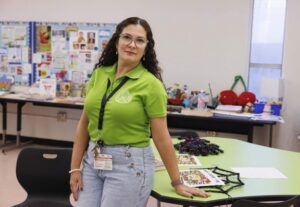
Ileana Trujillo, early childhood instructor and director for childcare facility, in the classroom at Lindsey Hopkins Technical College in downtown Miami.
Carol Evaristo, 23, who just started in the surgical technician program, said, “I see myself graduating, getting a job in the medical field, and loving what I do.”
Evaristo moved from Boston to attend Lindsey Hopkins after finding out about the program through online research. She said it was hard to find housing, but that it was worth it because the program was so affordable.
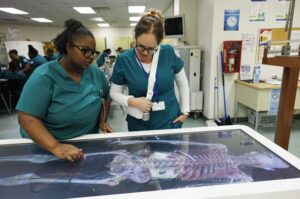
Carol Evaristo, left, and another student in the Surgical Technology program at Lindsey Hopkins Technical College, took at a cadaver on a screen.
Her instructor, Keishel Panton, graduated from Lindsey 13 years ago and returned to teach after working at Jackson Memorial Hospital, the University of Miami, and as a traveling nurse. Panton says the biggest thing she emphasizes to her students — no matter their age or background — is that the patient is king and that everyone in an operating room has to work as a team. The surgical technician classroom looks like a fully-equipped operating room, complete with medical instruments and an exam table.
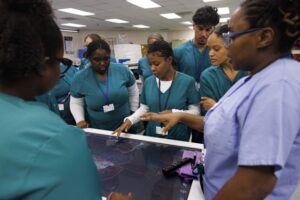
Students in the Surgical Technology program at Lindsey Hopkins Technical College in downtown Miami.
As artificial intelligence and technology increasingly replace many of the white collar jobs college graduates used to get, the hands-on skills students learn at Lindsey will apply for trades that are less easily replaced, Osbourne said. “Lindsey is a hidden gem,” she said.



